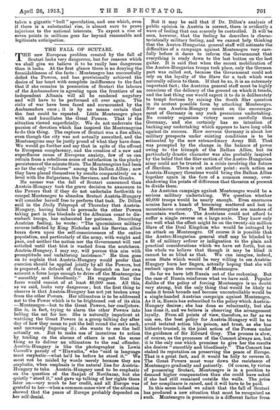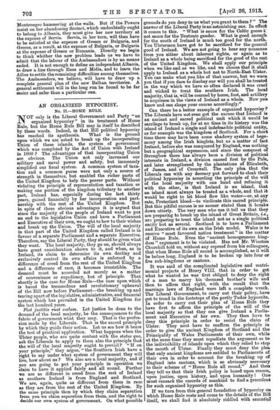THE FALL OF SCUTARI. T HE new European problem created by
the fall of Scutari looks very dangerous, but for reasons which we shall give we believe it to be really less dangerous than it looks. At the first glance there is no denying the formidableness of the facts : Montenegro has successfully defied the Powers, and has provisionally achieved the desire of her heart with complete indifference to the fact that if she remains in possession of Scutari the labours of the Ambassadors in agreeing upon the frontiers of an independent Albania will all be rendered nugatory and will have to be performed all over again. The risks of war have been faced and surmounted by the Ambassadors once ; it is by no means certain that the feat could be repeated. Little Montenegro plays with and humiliates the Great Powers. That is the situation viewed superficially. We do not underrate the passion of devotion which has inspired the Montenegrins to do this thing. The capture of Scutari was a fine affair, even though the city was not actually assaulted, and the Montenegrins may be justly proud of what they have done. We would go further and say that in spite of the affront to European complacency, and the creation of a new and superfluous cause of European anxiety, few of us can refrain from a rebellious sense of satisfaction in the plucky persistence of the minute State. The Montenegrins had been so far the only "failures" among the Balkan Allies ; now they have placed themselves by results comparatively on a level with the Bulgarians, the Servians, and the Greeks.
No sooner was the fall of Scutari announced than Austria-Hungary took the grave decision to announce to the Powers that if they do not undertake forthwith to compel Montenegro to abandon Scutari Austria-Hungary will consider herself free to perform that task. Dr. Dillon said in the Daily Telegraph of Thursday that Austria- Hungary, having failed to persuade the other Powers taking part in the blockade of the Albanian coast to dis- embark troops, has exhausted her patience. Describing Austrian feeling, he wrote : "The ignominious military reverse inflicted by King Nicholas and his Servian allies bears down upon the self-consciousness of the entire population, and particularly of the army, with weight and pain, and neither the nation nor the Government will rest satisfied until that blot is washed from the scutcheon. Austria-Hungary, I may say, will pursue this aim with promptitude and unfaltering insistence." He then goes on to explain that Austria-Hungary would prefer that coercion should be applied jointly by all the Powers, but is prepared, in default of that, to despatch on her own account a force large enough to drive off the Montenegrins "smoothly and bloodlessly." He a that the force would consist of at least 40,000 men. All this, as we said, looks very dangerous ; but the first thing to observe is that Austria-Hungary has not yet broken away from the other Powers. Her ultimatum is to be addressed not to the Power which is to be frightened out of its skin —Montenegro—but to the Great Powers, her coadjutors. She is, in fact, trying to alarm the other Powers into belling the cat for her. She is naturally impatient at watchins. the Great Powers in a group talking day after day of how they mean to put the bell round the cat's neck, and nervously fingering it ; she wants to see the bell actually on. But to make use of incentives to action by trading on the alarms of others is not the same thing as to deliver an ultimatum to the real offender. Austria-Hungary is like the photographer in Lewis Carroll's parody of "Hiawatha," who "said in language most emphatic—what he'd be before he stood it." We must not be misled by words merely because they are zmpliatic, when emphasis is the natural line for Austria- Hungary to take. Austria-Hungary used to be emphatic on the question of the Sa,njak of Novibazar, but she quietly stood it," and gave up talking of her rights there later on—very much to her credit, and all Europe was grateful to her—when a common-sense view of the situation showed that the peace of Europe probably depended on her self-denial. But it may be said that if Dr. Dillon's analysis of public opinion in Austria is correct, there is evidently a wave of feeling that can scarcely be controlled. It will be seen, however, that the feeling he describes is charac- teristically military feeling, and we cannot help thinking that the Austro-Hungarian general staff will estimate the difficulties of a campaign against Montenegro very care- fully before it dares to inform the Government that everything is ready down to the last button on the last gaiter. It is said that when the recent mobilization of the Austro-Hungarian troops took place, only the German part was called out, because the Government could not rely on the loyalty of the Slays for a task which was naturally odious to them. If that be so, it is an extremely important fact ; the Austrian general staff must be highly conscious of the delicacy of the ground on which it treads, and the last thing one would expect it to do is deliberately to tempt fortune by raising the South Slav question in its acutest possible form by attacking Montenegro. Nor can Austria-Hungary count on the encourage-. meat of Germany in any such precarious undertaking. No country organizes victory more carefully than Germany, and she certainly has no intention of backing any undertaking which appears to have long odds against its success. How nervous Germany is about her military prospects under existing conditions is to be estimated by the new extraordinary Army Bill. That was prompted by the change in the balance of power owing to the triumph of the Balkan Allies, but its particularly drastic character was also probably inspired by the belief that the Slav section of the Austro-Hungarian army could not be trusted in a crisis involving the future of Slavdorn. There is yet another point : such action as Austria-Hungary threatens would bring the Balkan Allies together again in the face of a common enemy, over- shadowing the points of difference that threaten at present to divide them.
An Austrian campaign against Montenegro would be a serious military undertaking. We question whether 40,000 troops would be nearly enough. Even enormous armies have a knack of becoming scattered and lost in mountainous country. The Montenegrins are masters of mountain warfare. The Austrians could not afford to suffer a single reverse on a large scale. They know only too well what the effect might be on the twenty-six million Slays of the Dual Kingdom who would be outraged by an attack on Montenegro. Of course it is possible that the Austro-Hungarian general staff may be blinded by a fit of military ardour or indignation to the plain and practical considerations which we have set forth, but on the whole we believe that though it may be blind it cannot be so blind as that. We can imagine, indeed, some State which would be very willing to see Austria- Hungary burn her fingers, actually hoping that she will embark upon the coercion of Montenegro.
So far we have left Russia out of the reckoning. But the case of Russia reinforces what we have said. Popular dislike of the policy of forcing Montenegro is no doubt very strong, but the only thing that would be likely to make it break bounds and become uncontrollable would be a single-handed Austrian campaign against Montenegro. As it is, Russia has subscribed to the policy which Austria- Hungary desires ; she has done so reluctantly, but she has done it, and we believe is observing the arrangement loyally. From all points of view, therefore, so far as we can see, the best policy for Austria-Hungary will be to avoid isolated action like poison, and trust, as she has hitherto trusted, in the joint action of the Powers under the guidance of Sir Edward Grey. The process is slow, of course, as the processes of the Concert always are, but it is the only one which promises to give her the results she desires "smoothly and bloodlessly." The Concert has staked its reputation on preserving the peace of Europe. That is a great fact, and it would be folly to reverse it. The Great Powers must wear down the resistance of Montenegro gradually and patiently. Of course, by virtue of possessing Scutari, Montenegro is in a position to demand higher compensation than she could have asked if she had still remained outside the walls. The price of her compliance is raised, and it will have to be paid.
In this sense indeed we admit that the fall of Scutari has produced a new situation that must be recognized as such. Montenegro in possession is a different factor from Montenegro hammering at the walls. But if the Powers insist on her abandoning Scutari, which undoubtedly ought to belong to Albania, they must give her new territory at the expense of Servia. Servia, in her turn, will then have to be satisfied at the expense of Greece or Bulgaria, and Greece, as a result, at the expense of Bulgaria, or Bulgaria at the expense of Greece or Rumania. Directly we begin to think whither the new problem leads us we have to admit that the labour of the Ambassadors is by no means ended. It is not enough to define an independent Albania, to draw a line through Enos and Midia, and to leave the Allies to settle the remaining difficulties among themselves. The Ambassadors, we believe, will have to draw up a complete general plan of the new Balkan territories. A general settlement will in the long run be found to be far easier and safer than a particular one.



























































 Previous page
Previous page